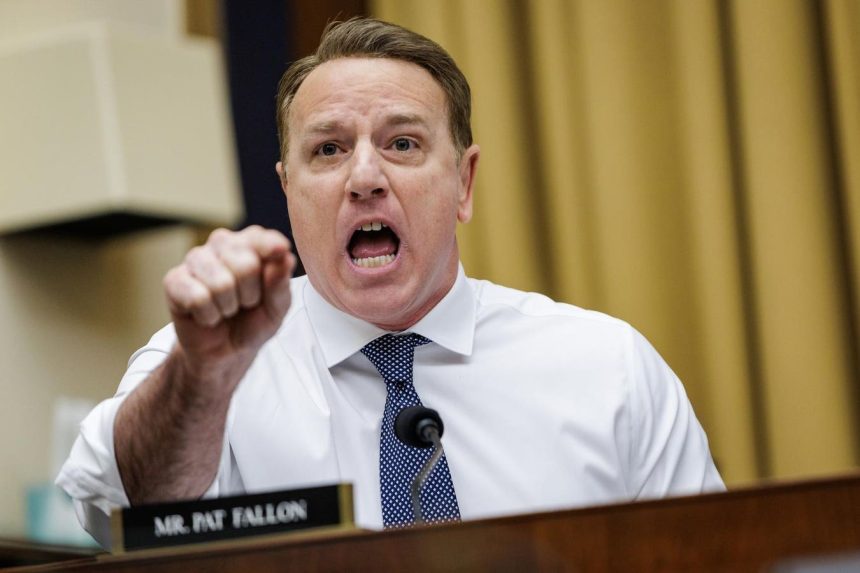The heated exchange between Representative Pat Fallon and Acting Secret Service Director Ronald Rowe during a House task force hearing on the assassination attempts against former President Donald Trump laid bare the intense scrutiny facing the agency. Fallon, a Republican from Texas, aggressively questioned Rowe about his presence at the 9/11 memorial service in New York City earlier that year. He accused Rowe, then a special agent in charge, of deliberately positioning himself close to President Biden and Vice President Harris for personal gain, suggesting he was “auditioning” for the director position, and compromising the security of the protectees. Rowe vehemently denied these accusations, asserting he was there due to his personal connection to the tragedy, having responded to Ground Zero in the aftermath of the attacks. The exchange quickly escalated into a shouting match, with Fallon pointedly accusing Rowe of endangering the President and Vice President, while Rowe countered by calling Fallon a “bully” and accusing him of exploiting 9/11 for political purposes.
The contentious backdrop of this exchange was the Secret Service’s acknowledged failures leading up to two separate attempts on Trump’s life. Rowe, who replaced former Director Kimberly Cheatle following the first attempt, expressed profound remorse for the agency’s shortcomings. The first incident, on July 13, 2024, at a Trump rally in Butler, Pennsylvania, saw a gunman, Thomas Matthew Crooks, fire eight rounds from a rooftop position, grazing Trump’s ear and killing an audience member. The second attempt occurred in September at Trump’s West Palm Beach golf club, where a gunman, Ryan Routh, was spotted aiming a rifle at Trump before fleeing and being apprehended. These incidents exposed critical security lapses within the Secret Service, including inadequate rooftop security at the rally and insufficient coordination with local law enforcement.
Rowe’s testimony before the House task force was a stark admission of the agency’s failures. He acknowledged the gravity of the situation, expressing personal responsibility for the near-fatal incident and the loss of life. The task force, comprised of both Republicans and Democrats, unanimously voted to submit its final report on the assassination attempts to the full House, signaling the bipartisan concern over the serious breaches in presidential security. The incidents have prompted a wave of criticism and calls for reform within the Secret Service, raising questions about the agency’s ability to effectively protect high-profile individuals.
Fallon’s line of questioning, while aggressive, sought to uncover any potential contributing factors to the security failures, including exploring whether ambition or self-promotion within the Secret Service played a role. His focus on Rowe’s presence at the 9/11 memorial seemed aimed at establishing a pattern of prioritizing personal visibility over security protocols. However, Rowe’s forceful rebuttal and his personal connection to the 9/11 tragedy complicated the narrative. The heated exchange ultimately served to highlight the tension and pressure surrounding the investigation, with both Fallon and Rowe displaying strong emotions.
The assassination attempts against Trump and the subsequent investigations have placed the Secret Service under unprecedented scrutiny. The agency has been forced to confront its vulnerabilities and acknowledge its shortcomings. Rowe’s appointment as Acting Director following Cheatle’s resignation signifies an attempt to address these issues and rebuild public trust. However, the heated exchange with Fallon underscores the ongoing challenges the agency faces in navigating the political landscape while striving to fulfill its core mission of protecting national leaders.
The task force’s unanimous vote to submit its report suggests a commitment to thoroughly investigate the incidents and identify systemic issues within the Secret Service. The findings of the report are likely to have significant implications for the agency’s future, potentially leading to reforms in security protocols, training procedures, and leadership structures. The incidents serve as a stark reminder of the ever-present threats to national security and the crucial role of the Secret Service in safeguarding the lives of the nation’s leaders. The ongoing investigations and potential reforms will be critical in determining the agency’s ability to effectively address these threats and prevent future tragedies.



